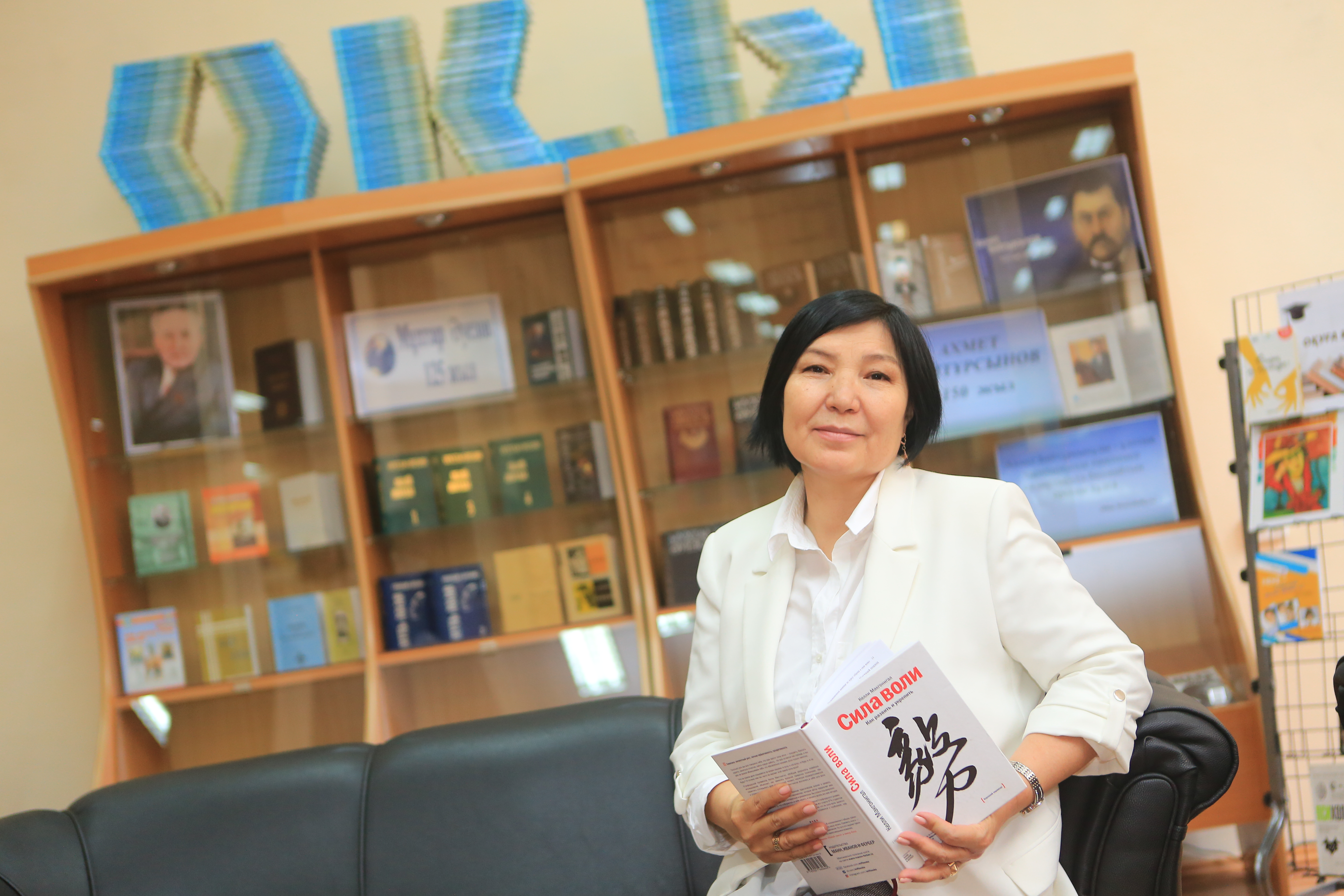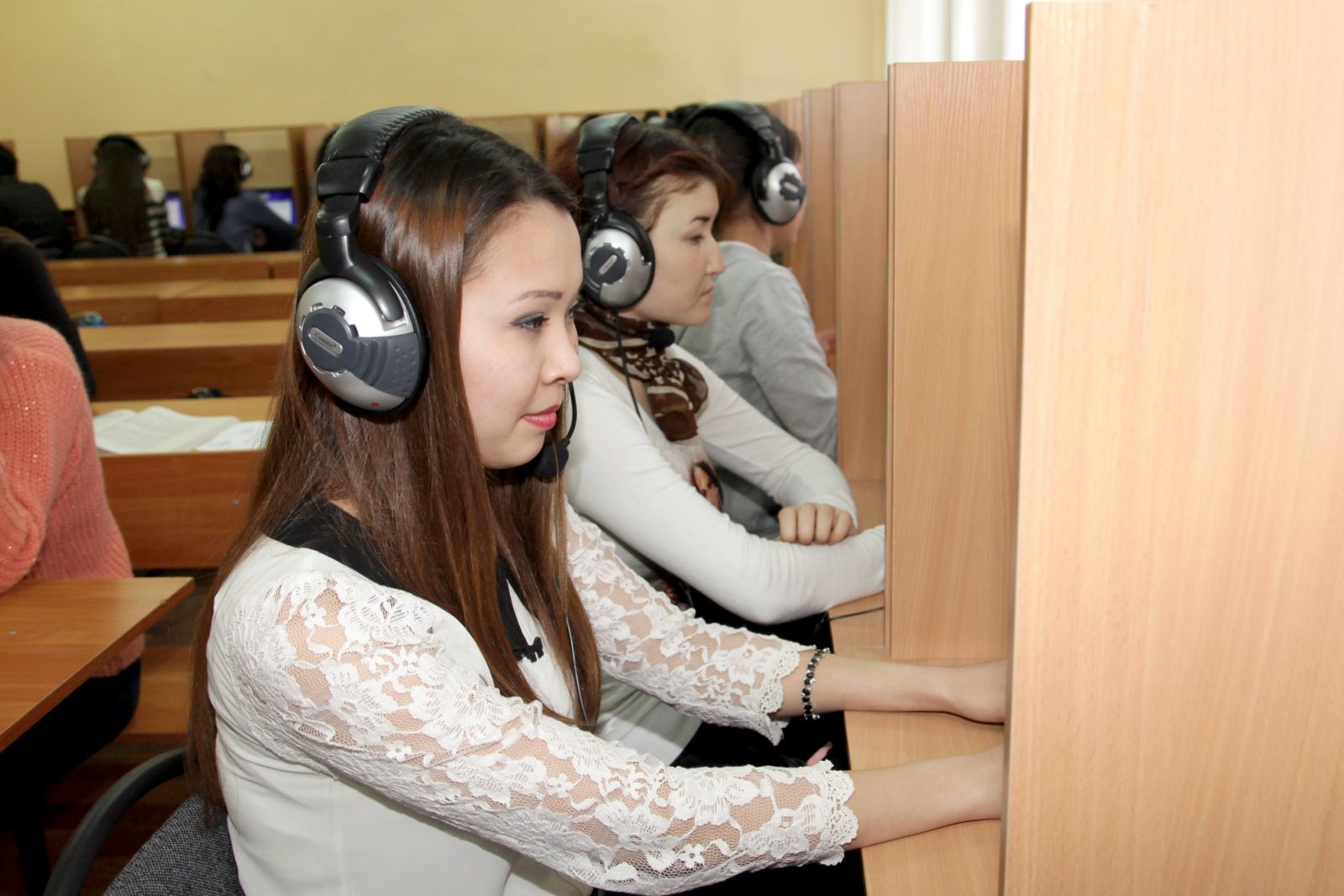Modern Languages and Translation Studies
- Pages en
- Hits: 1870

Head of the department
Karbozova Gulnara Kumisbekovna
Candidate of philological sciences, associate professor
Аddress: 160012, The Republic of Kazakhstan, Shymkent, T. Tazhibayev street, 2, Building #8, M.Auezov South Kazakhstan University, Faculty of Philology, department of Modern Languages and Translation Studies, room 413.
Phone: 8 (7252) 36-71-93
►Catalog of elective disciplines 2019-2020 academic year
►Catalog of elective disciplines 2020-2021 academic year
►Catalog of elective disciplines 2021-2022 academic year
►Educational program 6B02330 – Foreign philology
►Educational program 6B01730 – Foreign language: two foreign languages
►Educational program 6B02320 – Translation studies
►Educational program 7M02330 – Digital Linguistics and Intercultural Communication
General information on the history of the department:
The Modern Languages and Translation Studies department is formed in 1999 on the basis of the English philology department. From 1999 to 2012 chair the senior teacher, the excellent lecturer of formation of RK Telgaziyeva Gulnara Azimkhanovna, she is the member of regional EMC of KazUIRandWL named after Abylay khan. Under the leadership of Telgaziyeva G. A. the close relations with the Corpus of the World USA in Kazakhstan, were improved by educational institutions of Spain and Germany.
Since 2012 the department is headed by Cand.Phil.Sci., associate professor Karbozova G. K. – the expert in the field of comparative historical linguistics. In 2010 she passed scientific training according to the Bolashak program in RCEAL of the Cambridge University (Great Britain).
Since that time more than 10000 teachers of English got their diplomas and now are working at different educational institutions of the Southern Kazakhstan and abroad.
Teaching staff of the Modern Languages and Translation Studies department
The department trains:
- bachelors on Educational Program 6B01730 – Foreign language: two foreign languages. Term of studying – 4 years.
- bachelors on Educational Program 6B02320 – Translation studies. Term of studying – 4 years.
- bachelors on Educational Program 6B02330 – Foreign philology. Term of studying – 4 years.
- masters of degree on Educational Program 7M02330 – Digital Linguistics and Intercultural Communication. Term of studying – 2 years.
Information about students of"Modern Languages and Translation Studies"department in 2019-2020 academic year
Research work
The subject of the research work is “Innovative potential of applying active and interactive methods of education for developing students’ creativity in the context of quality management system of training foreign language teachers”. The department lecturers actively participate in the international conferences of Republic of Kazakhstan and CIS countries (Uzbekistan, Kyrgyzstan, Russia Federation, etc.).
In order to integrate education and science in the framework of grant financing of scientific and technical projects for 2018-2020, a study is being conducted on the project “Formation of the moral culture of students in the study of a foreign language in the trilingual education”. The results of scientific work of teachers of the department are published in the journals included in the Scopus database, along with national and foreign scientific publications.
The chair also supports close cooperation with the leading higher education institutions of Kazakhstan, Russia, Spain, Poland, Latvia and People's Republic of China. Within Bolashak program and Teaching staff of chair pass training in National training center and using experience in educational scientific process.
Students of chair are involved in research work in the circles “Zhas galym”, “Academic writing”, “Art of debating”, “Wir sprechen Deutsch”, “Han hue jia” and as a result participate on competition of research works of students and also receive prize-winning places in the Republican Olympics. Student's scientific research works have something in common with the state budgetary subject of chair, and also with actual problems of teaching foreign languages, linguistics and rather – historical and typological linguistics
Work on students’ upbringing
Educational events of chair are held in the directions civil and patriotic, legal, spiritual and moral education and formation of religious tolerance, formation of a healthy lifestyle.



The students of the department participating in different activities
Practice is the truth criterion.
Educational, production and externship of students takes place in Nazarbayev intellectual school and specialized gymnasiums and lyceums, and also in translation bureaus and in firms of Shymkent.



Students of the department during the school practice
International Relations
International relations of chair get stronger. We closely cooperate with Council of USA in Kazakhstan both the British Council (Great Britain) and the academic service DAAD.




At the department, the academic mobility of teachers is systematically realized. Within the framework of the Fulbright program in 2016-2017 academic year, Professor Nathan T. Carr of California University conducted classes in major disciplines; a lecturer of the University of Pisa (Italy), Mirko Tavozanis delivered a course of lectures on the English literature. In 2016, the head of the English Linguistics Department Gulnara Karbozova delivered a course of lectures at the University of Cadiz (Spain) on the program Erasmus + K107.
Currently, a Master of Business Administration of Xinjiang University of Finance and Economics, Luan Xinrong conducts practical classes in the Chinese language, master lecturer Avi Tepfer under the program “English Fellow” organized by USA embassy conducts practical classes in the English language.

Professor Nathan Carr and senior lecturer Aigul Beysembayeva at Nazarbayev intellectual school


Master Luan Xinrong teaching his students the Chinese writing

Master Avi Tepfer with his students during the practical class
In 1999 21 citizens of Turkey got diplomas at our university with the speciality of a foreign language teacher. For many of foreign students Kazakhstan has become the second motherland, and the majority of them, due to the knowledge gained at the university, are Master students of the USA universities. Our students include citizens of China, Spain and Kyrgyzstan Turkmenistan, Korea. And also students of chair are trained in the leading higher education institutions of Spain, Latvia, Poland, the USA, etc. according to the program of external academic mobility.




External mobility of the department students
The education course is based on the International standard and the usage of the innovative educational technologies as well as introduction of active and interactive methods of teaching English, German, and Spanish language.
During last years our students take an active part in the regional competition for Shymkent universities, where they traditionally occupy prize places for the best knowledge of English, Kazakh and Russian languages.

During last years our students take an active part in the regional competition for Shymkent universities, where they traditionally occupy prize places for the best knowledge of English, Kazakh and Russian languages.

The winner of the national competition “Spelling Bee” Tastanbek Serikbolsin
Information for applicants
Bachelor Qualification characteristics of Study Program «6B01730 – Foreign language: two foreign languages»
The graduate must be prepared for the educational (pedagogical), experimental and research, organizational and managerial, social and pedagogical, educational and technological activity.
In accordance with the international standards the Bachelor must possess a high level of fundamental and foreign language communication at the international level.
Sphere of the professional activity. Bachelors perform their professional activity in the sphere of foreign language education, which frameworks enhance the development of the personality by means of foreign language.
Objects of the professional activity. The objects of the professional activity of Master program graduates are LLL educational institutions of foreign language teaching.
- Primary, comprehensive and profile school,
- Specialized school
- Secondary technical and professional educational institutions,
The subjects of bachelors’ professional activity of the mentioned specialty are:
- Organizing the teaching process on foreign language
- Organizing the teaching process on language for specific purposes
- Organizing the teaching process on language for academic purposes
Qualification characteristics of Study Program 6B02320 “Translation studies”
Sphere of the professional activity. Master program graduates on Study Program 6B02320 – "Translation studies" can work in the following spheres: culture and intercultural communication; sphere of administration and management; sphere of international relations; publishing; mass media; sphere of information and ideology; sphere of information and analysis; sphere of education and science, defense and national safety, etc.
The objects of the professional activity. The objects of the graduates’ professional activity are: cultural institutions; international organizations; information and ideology agencies; different agencies on information and ideology agencies; different agencies on information and analysis, embassies and representatives, ministries, defense and national safety enterprises and national safety enterprises and organizations, tourist agencies, publishing houses, translation offices.
Subjects of the professional activity. According to the provided fundamental and specialized training the subjects of the professional activity are: translation, interpretation and summarizing information, texts of different genres, including fiction, theoretical problems of the translation science, philology, business correspondence, as well as providing educational assistance in the sphere of using innovative technologies for translation purposes.
Kinds of professional activities. Bachelors on Study Program 6B02320 – "Translation studies" can perform the following kinds of the professional activity: translation (written translation of texts on diversified genres documents, interpretation of negotiations, cross border meetings and conferences); organizational, managerial, creative (translation of literary works from the foreign language into the native one and from the native language into the foreign one); information and analysis, publication, research, work in mass media.
Functions of professional activity. The graduate with the Study Program 6B02320 – "Translation studies" must be ready to perform the following functional duties: to provide help in cross language communications, translations and interpretations, texts compilation and summarizing, etc.
Directions of the professional activity. Translation studies of the professional education of the Republic of Kazakhstan corresponds to the classificatory of the speciailties of Bachelor’s and Master’s programs of the Republic of Kazakhstan, confirmed in March 2004 by the order of the Ministry of industry and commerce.
The content of the professional activity. The aide-translator must perform the written translation at state establishments and organizations, dealing with external political, external economical, research and cultural relations of the republic with other countries, in different branches of economics in order to provide them with translations of scientific and technical materials. Aide-guide must perform interpretations and translations in the system of cross border tourism. Linguist interpreter must perform two way translation and interpretation, translation of fiction and technical texts, correction, and processing of foreign language texts of different genres at agencies dealing specializing on information and ideology, provision of consultations on language and translation issues. The interpreter dealing with spontaneous translation must perform interpretation of the official speeches at the cross border conferences. Fiction literature translator must be able to provide the practical activity in this sphere of translation.
Qualification characteristics
Bachelor’s degree, Study Program «6B02330 – Foreign philology»
Sphere of professional activity. Bachelor-philologist can perform his professional activity in the sphere of philological education as a teacher of foreign languages and literature at secondary profile, post-secondary professional educational institutions specializing in humanities. Bachelor-philologist can also work at research institutions as a philologist-junior researcher. Objects of the professional activity. The objects of the graduates’ professional activity are:
- Secondary profile (gymnasiums, liceums). secondary professional (secondary schools), and post-secondary, professional (colleges) educational institutions, specializing on humanities;
- institutions using the work of interpreters ;
- publishing houses of newspapers and magazines, radio and TV, printing;
- profile research institutions, libraries;
- Other objects according to the speciality profile.
Subjects of professional activity of graduates on Study Program 6B02330- Foreign philology
Teaching a foreign language (practice and theory) and literature of the countries under consideration at educational institutions (including special) at secondary educational institutions (including special) at secondary educational institutions, developing research themes at research institutions and HEI, performing duties of literary workers and/or translators at publishing houses of newspapers and magazines, radio and TV, as well as other interested establishments.
Kinds of professional activity:
- educational( pedagogical);
- organizational and managerial;
- research;
other kinds of the professional activity requiring the fundamental knowledge of linguistics and literature on the basis of the practical acquisition of foreign languages .
Functions of the professional activity. Bachelors on Study Program 6B02330 - Foreign philology are trained to perform functions of the teacher of foreign languages and literature at secondary profile and professional post-secondary professional educational institutions, specializing in humanities, teaching personnel, managing the educational process on the intermediate level, as well as philologists – junior level research.







.jpg)








